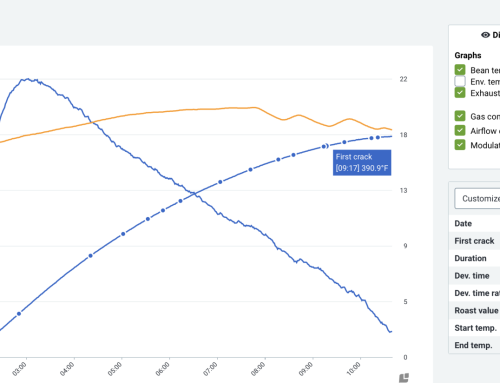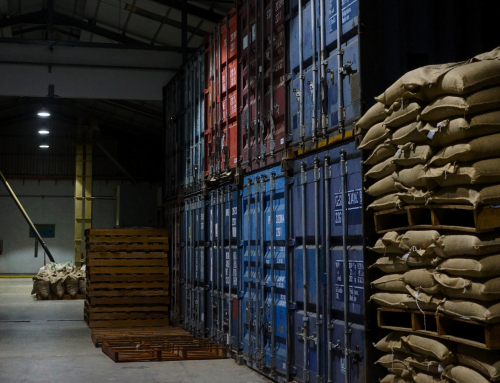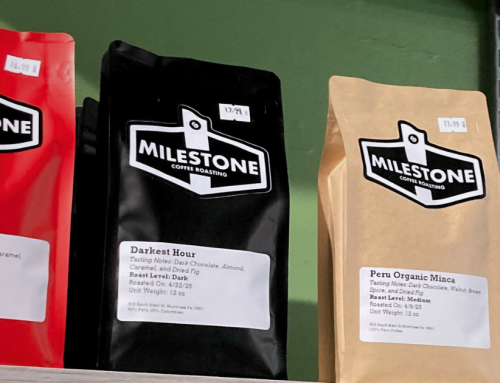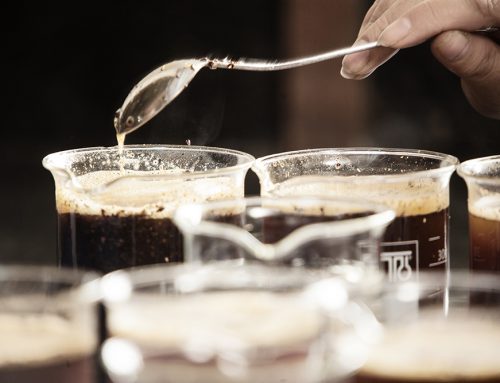Genuine Origin has been closely following Uganda’s progression as a specialty coffee producer for years. We’ve done this with the help of our sister company and sourcing partner in the region, Kyagalanyi Coffee Ltd. Uganda continues to astound everyone with improvements in cup quality. Moreover, they show determination to create impact on every scale. This includes small and large initiatives tailored for the diverse producing regions around the country.

Uganda Coffee Cherries on raised beds
Uganda Coffee History
With a history dating back over a century, coffee has become deeply entrenched in the fabric of Ugandan society. It has shaped its economy, culture, and global reputation. It all began with wild Robusta, which grew natively throughout the shores of Lake Victoria. The Robusta was domesticated by the Baganda people, who cultivated it in their household gardens.
Robusta coffee held significance for traditional and cultural ceremonies in the Buganda Kingdom. However, the arrival of Europeans in East Africa changed things. They colonized the kingdoms in the area, minimizing the importance of coffee. They even spread misinformation, claiming it was unhealthy. Eventually, coffee became a commoditized crop after losing its cultural significance.
Arabica coffee didn’t arrive in Uganda until the early 1900s when European and Asian settlers came. British colonists established large coffee plantations in Central Uganda. However, these collapsed in the 1920s in the aftermath of World War I. With the departure of the British, Ugandan smallholders took up coffee production themselves. The remaining infrastructure became the foundation for cash income for nearly 20% of the Ugandan population.
In the early 1990s, a wave of interest in Arabica began to take hold. Increased investment into the coffee sector found its footing in Mount Elgon and the Rwenzori Mountains. These areas had fertile volcanic soil and high altitudes better suited for growing Arabica. Today, Robusta coffee makes up around 85% of Uganda’s total coffee production, and Arabica makes up the remaining 15%.

Ugandan coffee farmers with washed coffee
Uganda Coffee Production
While Ethiopia may be Africa’s top coffee producer, Uganda is the continent’s top exporter of coffee. And yet, they’re nowhere near their maximum potential. In our last origin report in 2021, Uganda recorded a production volume of 6.05 million bags of coffee. In just three years – ones fraught with challenges like the pandemic and shipping logistics – that number is forecasted to reach a record high of 6.85 million bags in the 2023/2024 season. This comes hand-in-hand with continued increases in coffee farmland, a trend that began before 2020 with government support to grow more Robusta.
Uganda exports over 6 million bags of coffee, all farmed by around 1.7 million smallholders. The average farm size is only 0.18 hectares, and it’s a challenge to reach most of them physically and economically. A prime example of tackling these challenges is the more recent development of Arabica coffee production in the Rwenzori Mountains by Kyagalanyi.
Most of the coffee from the Rwenzoris are traditionally drugars (dried Uganda Arabica), which are of very low quality due to the lack of infrastructure. Coffee cherries are poorly processed in homes and dried out on the ground, wherever space can be made.
Kyagalanyi’s mission is to show farmers the benefits of selling ripe cherries at regional buying stations instead of processing them at home. On the one hand, they’re educating farmers that they can get more money for cherries without having to invest their time and effort in the drying process for drugars, and on the other hand, Kyagalanyi is supplying effective transportation support to help get the heavier cherries to the buying stations.
In addition to the two new wet mills in the Rwenzoris that process 50 tons of cherries each per day (Kisinga and Bugoye), Kyagalanyi’s presence also includes mobile buying units, motorbikes and donkey transport teams throughout the 120-kilometer mountain range.
They do radio and talk shows to spread the word about how Kyagalanyi does things differently — and, more importantly, pays differently — for fresh quality cherries. Fun fact: Kyagalanyi even hired a local artist to write a song about this, blasting it on pick-up trucks with loudspeakers to get everyone to gather at the trading centers.
And it’s working. Responsibly sourced cherry volumes have gone from 0 to 325 million tons from 2015 to 2020. There are top quality naturals coming from the Rwenzoris, like the Uganda Bugoye Natural.

Picking ripe red coffee cherries in Uganda
Uganda’s Coffee Sector is Changing
Uganda is Africa’s up-and-coming specialty coffee powerhouse. Improvements in farming and processing are helping the region surge past socio-economic hurdles that have historically held this coffee origin back. Upgrades in quality and new washing stations are also substantially impacting the lives of the smallholder farmers who produce the coffee.
Coffee might only represent 20% of an average farm’s crops, but the income generated from it can account for 50% of the household’s annual revenue. Uganda has a 15-year Coffee Roadmap program, implemented by the Uganda Coffee Development Authority, with the goal of increasing production to 20 million bags by 2030 and tripling the income for producers.
One of the main constraints to achieving this goal is farm productivity. With most farmers being smallholders, most growers lack the option to expand land-wise. Kyagalanyi works with over 26,000 households to address crop productivity through Volcafe Way support operations and expects their reach to grow to 34,000 this year.
In 2020 alone, Kyaganlanyi conducted over 40,000 individual household trainings and 2,700 group trainings on agronomy, gender, and child education. But what’s truly impressive is how their engagement has led to clear results: 3,378 households completed a family vision, 2,567 households made a joined household plan, and 2,578 households made a coffee farm vision, according to Dr. Anneke Fermont, Regional Sustainability Manager for Kyagalanyi.
As Kyagalanyi implements the Volcafe Way throughout its operations in Uganda, another challenge that’s being addressed by the government and private companies alike is the local perception of the cash crop. Most of the farmers in Uganda grow bananas, cassava, onions, tomatoes, and other crops that are sold and consumed locally, but as a traditionally tea-drinking nation, coffee is not. However, in recent years, domestic consumption of coffee has risen from 300,000 bags to 325,000 bags as more people take up coffee drinking as a social activity, according to the USDA.

Uganda quality control manager with green coffee
Common Uganda Green Coffee Varietals
Robusta coffee is native to Uganda, and the two most common varietals found in the wild are known locally as Nganda and Erecta. Nganda is a Robusta varietal with high caffeine content and high sweetness that’s rare for a Robusta coffee. Erecta, on the other hand, is more neutral in flavor but also expresses a slight acidity. Research is being done on producing cultivars from these two strains to improve disease resistance, yield, and drought resistance.
The most common Arabica varieties found in Uganda are Kent, Typica, SL-14, and SL-28, taken from the neighboring countries of Ethiopia, Kenya, and Malawi.
While Coffea liberica, locally known as Kisansa, also grows natively in Uganda, it has yet to be traded commercially.
Uganda Green Coffee Producing Regions
From the verdant slopes of Mount Elgon to the fertile lands surrounding Lake Victoria, Uganda’s geographical diversity provides an ideal environment for coffee cultivation. Robusta is cultivated in the central and northern lowlands. Arabica coffee, however, grows mainly in three regions: the Rwenzori Mountains, Mount Elgon, and the West Nile.
The Rwenzori Mountains, also known as the Mountains of the Moon, sprawl across the border between Uganda and the Democratic Republic of Congo. Elevations span 1,500 to 2,300masl, with nitrogen-rich soil perfect for cultivating Arabica coffee.
On Mount Elgon, East Africa’s oldest volcano, coffee farms dot the slopes from 1,600 to 2,100masl, shaded by forests on the steep terrain. Donkeys are often employed to carry cherries from farm to mill.
In the West Nile region, ranging from 1,300 to 1,600masl, indigenous banyan trees provide shade to the coffee farms. Coffee is typically wash-processed here and has a citrusy character.

Warehouse in uganda – milling coffee
What is Bugisu coffee?
Bugisu coffee from Uganda is a classification of washed Arabica coffee from the sub-regions of Bugisu. Bugisu is a distinction of terroir and coveted for its winey, fruity character, including sweet notes of raisins and figs.
How are Uganda Coffee Beans Graded?
Arabica coffee from Uganda is graded based on screen size and number of defects, ranging from AA to CPB.
| Classification | Screen Size | Defect Tolerance |
| AA | 90% above 17 | 5% |
| A | 60% above 17 | 7% |
| A+ | 90% above 16 | 5% |
| B | 80% above 15 | 10% |
| PB | 80% above 15 | 10% |
| AB | 60% above 16 | 7% |
| CPB | 60% above 15 | 12% |
Ugandan green coffee can also be classified as drugar (natural dry Uganda Arabica), wugar (washed Uganda Arabica, not including Bugisus), or wur (washed Uganda Robusta).
Genuine Origin in Uganda
Founded in 1992, just after the coffee industry was liberalized in 1991, Genuine Origin’s sister company, Kyagalanyi, is one of Uganda’s oldest and largest coffee exporters. Even though producers have the freedom to market their coffee to buyers of their choice, poor public infrastructure and remote farm locations mean that options are limited. Kyagalanyi has been working for decades to change that; broadening market access is a crucial enabler for creating growth opportunities for the industry as a whole.
The Mount Elgon area is thriving; this eastern region borders Kenya, and the influx of investments and donations has stimulated the production of competitively high-quality coffee. Kyagalanyi has five regional washing stations and a team of 60 field staff in Mt Elgon. Between 2009 and 2018, Kyagalanyi reported an increase of 72% in coffee tree yields for their partner producers.
In West Nile, Kyagalanyi has done more than bring economic prosperity to an inaccessible and impoverished corner of Uganda. Household inspections are standard practice in Kyagalanyi’s farm certifications, and through that, there was a chance to create even more impact by advocating child education at the same time. Together with local NGOs and community partners, Kyagalanyi identified households where children were not in school and tackled the main hurdle for consistent enrollment: poverty.
Many households in Uganda cannot afford to pay the fees for school, uniforms, exams, and supplies, which served as a big motivator for Kyagalanyi to help increase their income from coffee. In 2018, Kyagalanyi was recognized with the Rainforest Alliance Sustainable Standard-Setter Award for its exceptional commitment to creating a child-labor-free zone. This success story further cements Kyagalanyi’s presence in Uganda as more than just a coffee exporter.
After averaging the numbers from increased yields, improved quality, and higher pricing for better quality, Kyagalanyi’s operations have created a staggering USD6.5 million in additional value each year for Mount Elgon and West Nile producers combined.
Over the past few years, three Volcafe Way nurseries in Rwenzori distributed over 100,000 seedlings to farmers, with the main variety being SL14. In order to encourage the sustainability of farming as a business, Kyagalanyi is doing all it can to stimulate and demonstrate better agricultural practices that lead to better livelihoods all around. There’s still a long way to go, but even in the short time since their presence in the region, Kyagalanyi has already made a considerable impact in prices for farmers who sell directly to them (+50–70%!).
Kyagalanyi’s efforts aren’t just limited to Arabica coffee either; with 60–70% of their exports being Robusta, they’ve expanded the Volcafe Way farmer support program and certification standards to Robusta farms, too. In Masaka, the UTZ/RFA initiatives will reach up to 5000 farmers in the next few years.
Although the Rwenzori’s are known for producing naturals, Genuine Origin is excited to see more fully washed coffee in partnership with Kyagalanyi. Processing methods that are still new to the region, like carbonic maceration and anaerobic fermentation, have been tried and tested at washing stations in the Rwenzoris as we continue to push coffee forward, and the opportunity for honeys to become a more common offering are in the works.
It’s inspiring to see communities, businesses, leaders, and producers come together to uplift Uganda’s coffee industry as a whole and change the world’s perception of a truly promising coffee origin. There is so much potential here, and coffee roasters can expect more variety in processing and increased quality for lots in Genuine Origin’s Uganda portfolio.






